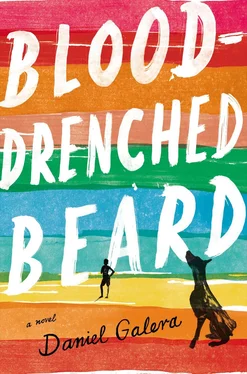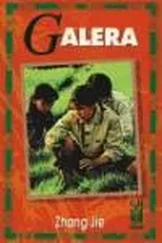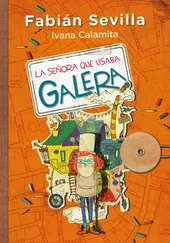• • •
T housands of people flock to the main square on the second Wednesday in June, on a freezing cold night, for the opening of the XIth Garopaba Church Fair with a Gian & Giovani concert. The country music duo’s songs have been playing nonstop on the local radio stations, and a five-year-old girl is now singing one at the top of her lungs while swaying on her father’s dancing shoulders. The square itself has disappeared beneath the crowd, the small stage, the main stage with its green, red, and blue spotlights and the dozens of stalls selling arts and crafts, drinks, pine seeds, mulled wine, and endless sweet and savory snacks. The air is filled with the smells of caramel, spices, baked mullet, fried foods, cigarettes, wet earth, minty colognes, and trampled grass. The whole town has turned out. Younger children climb the trees and sit there with their little legs dangling like rotten branches to watch the concert from above the mass of teenage gangs, hand-holding couples, and families advancing as a solid block. Everyone seems eager to see and be seen in the ant colony of the community in celebration, seeking a promised and greatly desired social catharsis. Some people are wearing their best dresses and suits. Heavy earrings and gold watches flash in the dark. Politicians, the disabled, doctors, police officers, fishermen, athletes, couples with prams, tramps, tourists. The town’s crazies are all there, mellowed by the chaos. There are also the bored, those who can’t sleep because of the noise and those who glance around with looks of disapproval or incomprehension. Everyone.
He walks alone holding a cup of mulled wine. He takes short, quick sips, partly because he is anxious about being in the middle of a bunch of people he knows whose faces he cannot recognize and partly because the icy night air cools the steaming mixture of sweet wine, sugar, cachaça, and cloves in a matter of minutes. One of the singers — he isn’t sure if it is Gian or Giovani — asks those who are in love to raise their hands and shout between one song and another. Everyone is in love. He watches the children playing on the plastic slide in the playground and riding around in the cabins of a tiny Ferris wheel as their parents look on and take pictures. Some parents smile and talk to their children, while others are lost in thought. Each cabin of the miniature Ferris wheel is a small, closed plastic cage, each cage is a different color, and the children inside them look frightened, about to fall asleep, or improbable as it may seem, self-conscious about where they are. Other children leap about wildly on trampolines and scamper like rodents through the passages and labyrinths of complex inflatable structures, screeching with laughter and shouting as they chase and flee from one another.
Someone calls his name, and he turns cautiously, afraid he won’t recognize the person. It is the twins, Tayanne and Rayanne, who are with their parents and another family of friends, to whom he is introduced as the girls’ swimming instructor. They have to speak up to be heard over the loud music, clamor of voices, and revving motorbikes. Gian and Giovani finish the concert and invite two girls from the audience up onto the stage with everyone watching. The girls are allowed to kiss the artists and are presented with Gian & Giovani towels. The group decides to get something to eat, and he accompanies them through the food stall circuit. There are hot dogs, steak rolls, sandwiches made with Lebanese bread, appetizing servings of French fries, and grilled sausage. The Pastoral Care for Children stall is selling fried pastries and skewers of meat. He buys some coconut candy from the Association of Parents and Friends of the Disabled stall. And there is still the entire dessert sector, with fried coconut shavings coated in brown sugar, coconut flans, chocolate and coconut fudge balls, cakes, star fruit, passion fruit, or apple compotes, handmade chocolates with nuts and wine, and a hugely popular delicacy known as “coconut delight.”
At some point in the evening, he catches sight of a silhouette without shoulders that can only belong to Bonobo. He is wearing red tracksuit bottoms and a white ski jacket and is drinking mulled wine with Altair and a bald guy who looks like a surfer. They are standing next to the small stage where, they tell him, a local street-dance group is about to perform. You’re going to be blown away by all the hotties, says Altair, who is sporting a shiny leather jacket and smoking a clove cigarette, puffing sweet-smelling smoke through his nostrils. The dance group performs an aggressive, eroticized dance that combines the aesthetics of tango with cinematically choreographed street-gang clashes in a mise en scène replete with simulated fights, seduction, and caresses, set to the sound of techno music. The dancers are wearing black and red skirts with slits up the side, fishnet stockings, jackets with flowers in the lapels, and hats. The girls really are beautiful, the men have athletic builds, the dance is vigorous and acrobatic, and the crowd applauds enthusiastically.
After the performance, the four of them head to a side street where the League of Women Against Cancer has set up a Mullet Feast tent. The fresh fish are baked over hot coals and served on clay roof shingles. A colorful buffet of side dishes is arranged on a real boat. They order two mullet and drink a few cans of beer while sitting at the plastic tables. The live performances end, and the tourists start returning to the vans and enormous buses that brought them there from all over the state.
The next morning he goes to check on Beta at the veterinary clinic. The operation went well, but Greice won’t allow visits yet and promises to call him when the time is right. He runs with the group on the beach early on the Friday morning, teaches swimming at the pool in the afternoon, picks up Pablo from school for the last time, and makes an online bank transfer to Bonobo from the Internet café. He spends Thursday and Friday nights at home in bed listening to the noise and music from the fair blending with the rhythmic wash of the waves under his window until well after midnight.
• • •
T he fair heats up again on the Saturday night. He watches the interminable coming and going of groups of adolescents with their dramas, crushes, and scheming. In the blink of an eye, they oscillate between laughter and seriousness, between being full of attitude and staring off into space. Couples in love walk along, light and serene, rubbing faces and exchanging body heat, looking proud. Those who aren’t quite as in love are resigned, carrying out a necessary ritual, and there are also those who look as if they have been forced together and are merely fulfilling an obligation. Some parade their partners like trophies, proud to be holding hands, or have their arm around the shoulder of someone who anyone can see doesn’t desire them or just tolerates them. There is hatred between some couples. Most of the single men are adult fishermen and old men in dress clothes. They are wearing tailored pants and sweaters or even suits and hats. They walk with their heads up. They have earned the right to their air of authority. For older members of the community, the church fair is a pompous occasion, and they appear to be inspecting the habits of the younger generations. They drink at the counters of beverage stands or wander about, not really understanding what is going on. They don’t look flustered. Nothing would surprise them at this stage.
The first Saturday attraction on the small stage is a funny educational play with an ecological theme. Three actors dressed in black bodysuits act out dialogues and make jokes about deforestation, global warming, and the hole in the ozone layer — which really isn’t a problem because all we have to do is wear SPF 349 on our bodies and 686 on our faces, right, everyone? — as well as pesticides and the hormones used in animal husbandry, which, according to the script, make men impotent and cause girls to menstruate at the age of nine. Night is falling. In the Little Miss pageant, ten girls of nine or ten represent their schools. One by one they parade quickly before three judges, one of them the parish priest, and then pose for the audience. They are wearing country costumes with checked dresses, frills, and bows in their hair. Some are shy and awkward, while others try to strut like adult models with burlesque results. The presenter asks each of them if they have something to say, and they state their names, ages, and the full names of their schools, which in some cases are quite hard to pronounce, and explain why they like to study there. Some have memorized texts that talk about their communities or neighborhoods, but those who improvise get more applause, especially when they get confused and look vulnerable. The littlest of all freezes up completely, forgets the speech she has learned off by heart, and gapes at the audience. She sways this way and that with a little smile plastered across her face until she is removed from the stage to the sound of great applause. The winner is from Pinguirito School, which Pablo attends. She parades again and is given an indecipherable gift. Then the Teen Miss is chosen. There are only three contenders, all of whom have broad hips, heavy makeup, and hair straightened with a flatiron. The Areias do Macacu Community representative is by far the prettiest, but the Garopaba Radio candidate, the preppiest, wins. They are all given enormous bouquets, almost as big as themselves. An area is cleared in front of the stage for a ribbon-dance performance by a group of elderly people. The men and women dressed in typical country clothes sing and dance while holding the ends of colorful ribbons tied to a central post, and the choreography follows commands in verse given over a microphone by a singer. They change partners, reverse the direction of the wheel, and weave the ribbons together in a complex pattern. He thinks it is beautiful, but the audience that is pouring into the square grows impatient and starts making a noise. The two beauty queens were invited to watch the ribbon dance, but only the Little Miss stayed and has been forgotten up on the stage by herself for twenty minutes, standing there in the cold, without anything to do. He is approached by someone who calls him “teacher.” He suspects it is Ivana and confirms it when she jokes about the difficulty of the previous day’s training session. Ivana is with her husband, and they make small talk during two belly-dancing performances. Male members of the audience jostle for a position in front of the stage. The second dancer is representing the goddess Lakshmi, but the presenter can’t pronounce the name. He gives up after a few tries and just repeats that she is doing the “dance of the goddess.” The schedule of performances on the small stage ends, and Ivana and her husband say good-bye and go off to do something else. The main stage lights up for the Garopaba Talent Show. He is already drinking his third cup of mulled wine and decides to get a sandwich. In the queue he recognizes Tracksuit Man from the tuft of hair escaping over the top of his shirt. He didn’t last more than a few weeks in the pool, but he says he is doing Pilates and loving it. They soon run out of things to talk about, and he excuses himself to go and watch the rest of the talent show. When he joins the crowd again a local soft-metal band called Random Reflections is wrapping up its short performance with a wall of distorted electric guitar music and drum rolls. Immediately afterward a girl who can’t be any more than ten years of age gets up on stage and plays a song by Sérgio Reis on the accordion with surprising skill and sings in a high-pitched, melodious voice. The crowd claps enthusiastically.
Читать дальше












